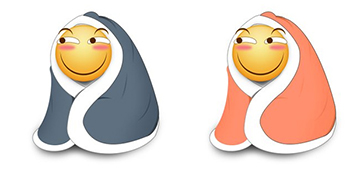
"Funny", a made-in-China emoji, inclusively used on Tieba, the largest Chinese communication platform provided by the search engine giant Baidu, seems to have recently moved beyond just China.
“贴吧”是中国最大的交流平台,由搜索引擎巨头“百度”推出。同时,它也是中国制造的表情符号“滑稽”的原生地。近来,“滑稽”似乎已走出了中国的大门。
Now, it is more than an emoji, but a cultural derivation.
如今,它已不仅仅只是一个表情符号,更是一种文化派生物。
Reaching global markets
进入国际市场
A series of "funny" emoji-based bolsters have attracted the attention of Japanese customers through Amazon Japan, an online shopping center.
一系列“滑稽”的主题抱枕在日本的网上购物中心“亚马逊日本站”上吸引了日本消费者的注意。
Even if one bolster costs about 1,750 yen ($16.73), more than three times the price in China, it doesn't dampen their desires to buy it.
即使一个抱枕的价格高达1750日元(16.73美元),超过在中国价格的三倍,人们的购买热情仍旧十分强劲。
One Japanese customer Miki said:
一位日本消费者Miki表示:
"They are just so cute and I bought three bolsters at one time for my family.
“这些抱枕实在太可爱了,我一次买了三个回家。
And every time I see them, my mood just brightens suddenly."
而且每次看到它们,我的心情就立刻转晴。“
"I think the emoji implies very complicated meanings.
“我觉得这个表情包含着非常复杂的意味。
Different people can read different things from it.
不同的人能从中读出不同的意思。
For example, my dad will send it on the occasion when he did not agree with someone but he has to say something and behave politely.
比如我父亲,每当他不同意别人的观点,但非得说点儿什么以示礼貌的时候,他就会发送这个表情。
But one of my friends think it is nothing but an expression of fun," said one Japanese netizen Kiro Kara.
但我的一个朋友就觉得它不过是一个好玩的表情,没什么其他含义,”一位日本网民Kiro Kara如是说。
Addition to Domestic Social Media
“滑稽”在国内社交媒体中的其他用意
Compared with Japanese people's impressions of the "funny" emoji, Chinese netizens prefer to use the emoji to tease one another on social media.
不同于日本人对“滑稽”表情的理解,中国网民常常在社交网站上用它调侃别人。
One commonly seen comment on the emoji in Zhihu, the Chinese version of Quora, is:
知乎(中国版Quora)上有一种很常见的论调:
"We strongly require Tieba to stop the usage of the emoji.
“我们强烈建议贴吧停止‘滑稽’的使用。
Because every time other people send me the emoji, I feel very uncomfortable and consider myself as a fool."
因为每次别人发送给我这个表情时,我都很不爽,还以为自己是个白痴。”
Reputed as the most popular emoji on Tieba, the "funny" emoji has received much attention since its release in 2013. As a matter of fact, the "funny" emoji is the updated version of the "drool" emoji.
作为贴吧上最流行的表情符号,“滑稽”自2013年出现后受到了很多关注。其实,“滑稽”是“流口水”的升级版。
Compared with the original, "funny" has a slightly opened mouth, a dull red flush and two eyebrows.
与“流口水”比起来,“滑稽”的嘴微微张开,脸上多了两团红晕和两根眉毛。
And all these characteristics render users a sense of satire, according to one insider.
据一位国人说,“滑稽”的种种脸部特征都给人一种讽刺的感觉。
If you think the emotion is the only cause for the "funny" emoji to go viral online, then you are wrong.
如果你觉得“滑稽”表现出来的情绪是唯一使其爆红网络的原因,那么你就错了。
In the next several years, the "funny" emoji has undergone many transformations and gradually engulfed the internet.
在其发布后的几年中,“滑稽”经过很多次改版,才最终攻占网络。
For example, the emoji is the first one on Tieba to have multi-color variations in red, orange, green, blue, bluish green, and purple。
例如,“滑稽”是第一个拥有多种色彩版本的贴吧表情,包括红色的,橘色的,绿色的,蓝色的,蓝绿的,还有紫色的。
When users utilize the shortcut key to send them together, its exaggerated effect is amplified.
当用户按下快捷键将它们一同发送出去时,这个表情的夸张效果就进一步放大了。
If you do not know this rule, you should check here.
如果你还不知道这个规则的话,看看这篇文章吧。
Meanwhile, the "funny" emoji is well-adopted in many settings and successfully gains attention outside Tibeba.
而且,“滑稽”适用于不同的聊天场景,在贴吧之外的平台上也大受欢迎。
For instance, the Quilt-Covering, the Police-Acting and Smoking versions are causing a stir everywhere in Chinese social life.
比如“盖被子”、“扮警察”和“抽烟”的版本,它们风靡中国社交生活的各个角落。
In Everyday Use Abroad
出没在国外的日常生活里
This is not the first time the Chinese emoji takes the world stage.
“滑稽”不是第一个登上国际舞台的中国表情。
Earlier this year, one emoji from the Chinese basketball celebrity Yao Ming has been spread through the Middle East region.
今年早些时候,中国著名篮球运动员姚明的一款表情在中东地区广为流传。
In Luxor, a city in southern Egypt, Yao's smiling emoji has emerged frequently in local traffic signs to remind people the road ahead is one-way.
在埃及南部的一座城市卢克索,姚明大笑的表情经常被用作当地交通指示牌,提醒人们前方是单行道。
And you may be surprised to find that many locals do not know Yao Ming but are familiar with his emoji and nickname "Chinese Funny Face".
也许你会觉得震惊,其实当地人并不认识姚明,但他们却对他的表情和“中国搞笑脸”的昵称很熟悉。
What's more, the emoji has been picked up by the Egyptian English-language daily newspaper Egyptian Gazette as the title picture for its humorous column Serious but Funny.
这个表情还被埃及的英语日报《埃及人报》选作其幽默专栏《严肃而搞笑》的标题图片。
What's more, due to the huge influences of Chinese Sina Weibo, the Chinese version of Twitter, many renowned western celebrities like Leonardo DiCaprio and Madonna have opened their personal accounts on the platform.
此外,被新浪微博(中国版推特)的巨大影响力吸引,不少西方名人,比如莱昂纳多.迪卡普里奥和麦当娜都注册了个人微博账号。
Many Chinese fans are excited about this and now choose to greet them with their own funny pictures, a behavior arousing the attention of foreign media.
很多中国粉丝因此十分激动,还用这些明星的搞笑表情对他们表示欢迎,这个行为吸引了外媒的注意力。
American private Internet media company BuzzFeed reported on the cultural phenomenon.
美国私人网络媒体公司Buzzfeed对这个文化现象做了报道。
As a newly emerging online language, emojis have risen to become an integral part of people's daily life.
作为一种网络新兴语言,表情符号已经升级成为人们日常生活必不可少的一部分。
Emojis are able to help people express their views in a more vivid and precise fashion.
表情符号的出现,使得人们能够用更生动、简洁而时尚的方式表达自己的观点。
Also, it can help foreigners learn about Chinese culture and learn the language.
而且它还能帮助外国人学习中国文化和汉语。
As Chinese emojis have slowly entered the world stage, how to properly use "the fifth innovation in China", a humorous name for emojis, without hurting others and how to turn them into commercial advantages still need answers.
随着中国表情符号登上国际舞台,有人幽默地称它为“中国第五大发明”,但是如何在不伤害他人的前提下恰当地运用它、如何将它转化成一种商业优势,仍然有待研究。












